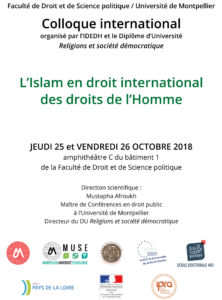International symposium “Islam in international human rights law”
This event has passed!
Faculty of Law and Political Science, Lecture Hall C, Building 1 – 39 rue de l’Université, 34060 Montpellier.
 While much research has been devoted to the place of human rights in Islam, there has been relatively little work on Islam in international human rights law, even though this is a crucial issue that raises questions about the tension between the universality of rights and the discourse on specificity.
While much research has been devoted to the place of human rights in Islam, there has been relatively little work on Islam in international human rights law, even though this is a crucial issue that raises questions about the tension between the universality of rights and the discourse on specificity.
This symposium project was inspired by two observations: firstly, a discrepancy between, on the one hand, the recurrence of caricatural discourse on Islam, often considered contrary to the ideology of human rights, and, secondly, the adherence of Arab-Muslim states to international human rights treaties, and even the development of an Arab-Muslim system of rights protection; Second, there has been a spectacular increase in litigation relating to Islam in the case law of human rights protection bodies.
Increasingly, international protection bodies must question the conventionality of practices and mechanisms derived from Islamic law. One need only mention the landmarkRefah Partisi v. Turkeyruling handed down by the European Court of Human Rights in 2003 on the compatibility of Sharia law with the values of the Convention.
This multidisciplinary event, while retaining a predominantly legal focus, provides an opportunity for broad and critical reflection on the links between Islam and international human rights law.
The aim is to try to go beyond simply comparing the principles of Islam and international human rights law in Islam, which obviously remains essential. The goal is to contribute to the discussion on solutions that—without denying the differences that may exist—highlight relationships based on mutual enrichment and complementarity.
The participation of practitioners who are members of international supervisory bodies will give concrete form to the ideas and proposals put forward.
